[The following is Nawaat`s liveblog of the events that unfolded on 25 July, following Mohamed Brahmi`s assassination.]
Mohamed Brahmi, a deputy who resigned from the Echa`ab party to found Attayar Echa`abi was assassinated on the morning of 25 July while he was leaving his home. The deputy, from Sidi Bouzid, was shot dead with fourteen bullets.
The following is a liveblog of the 25 July events as they happened:
1:50am: Friday, 26 July 2013: Tunisia’s Presidency declared Friday, 26 July as a day of "National Mourning."
1:15am Friday, 26 July 2013: (Below) Between three hundred and four hundred people marching to the Constituent Assembly.
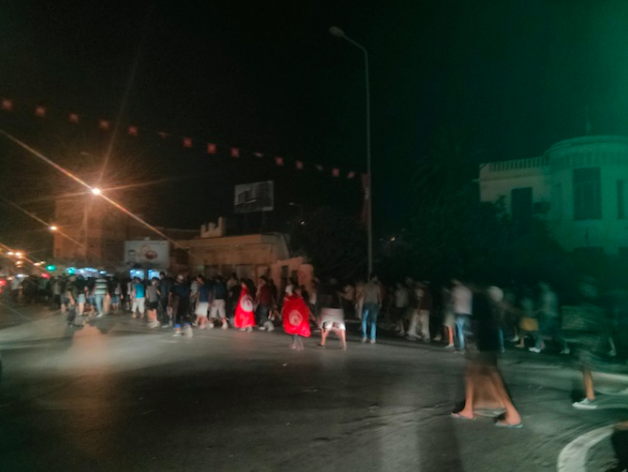
[1:15am Friday, 26 July 2013: Between three hundred and four hundred people marching to the Constituent Assembly.]
1am: Friday, 26 July 2013: Said Ayadi from Joumhouri party wrote on his Facebook wall that more than one hundred members announced their resignation from the party in protest of its policies and position.
12am – Bizerte: (below) Hundreds of protesters marching in Bizerte city outside the local government building.
12am – Gafsa: Violent clashes between protesters and security forces in front of the local party office of Ennahda in downtown Gafsa.
Earlier in the evening, hundreds of protesters gathered outside the local government building shouting slogans calling for the “overthrow the government.” The army, on duty outside the building, had to shoot live ammunition to deter the protesters from approaching the building. The police repeatedly fired teargas to disperse them. Clashes continue in the same time near the supermarket “Carrefour” in the city center. Protesters blocked several access to the city center with burning tires.
11:45pm – Place Mohamed Ali, UGTT – Tunis: (Below) Protesters heading back to Habib Bourguiba avenue.
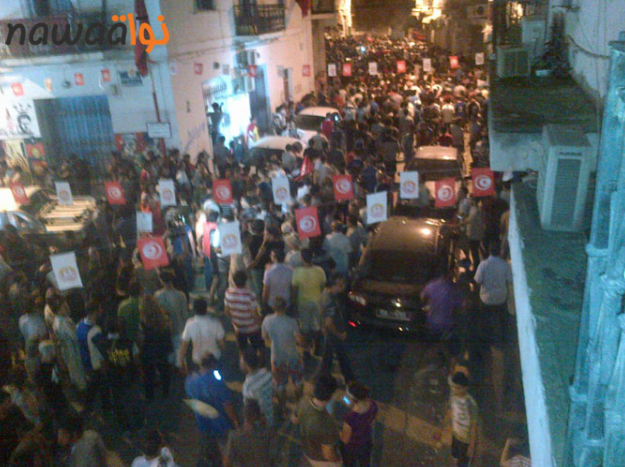
[11:45pm – Place Mohamed Ali, UGTT – Tunis: Protesters heading back to Habib Bourguiba Avenue.]
11:25pm – Sousse: Big demonstration in the city of Sousse calling for the fall of the regime.
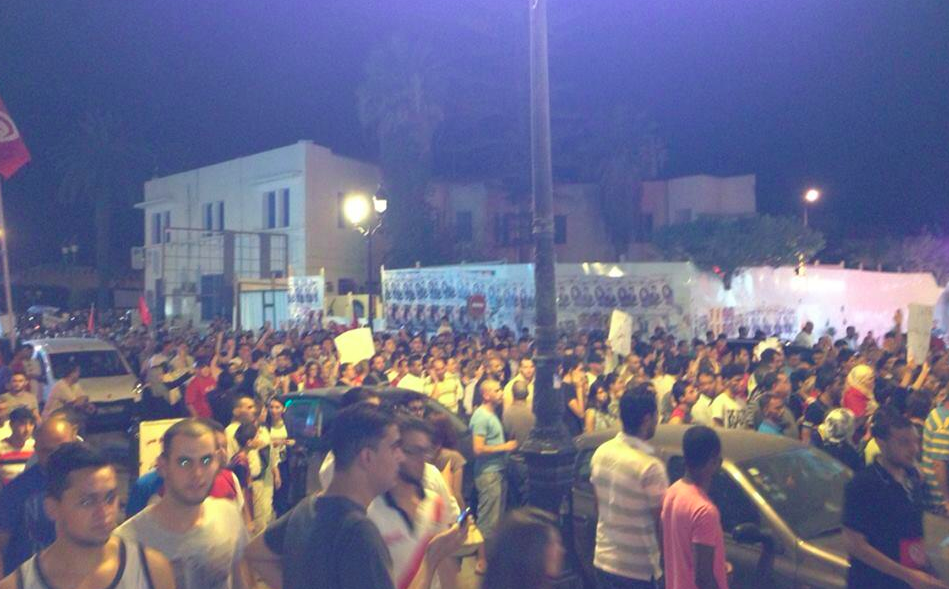
[Demonstration in Sousse calling for the downfall of the regime. Image from @Weld_El_Mongi.]
11:20pm – Sidi Bouzid: Violent clashes between police and protesters in front of the torched headquarters of the local government office. Massive security presence.
11pm – UGTT Labor Union HQ – Tunis: Individuals attacked demonstrators present in front of UGTT headquarters by throwing stones. Demonstrators responded. Tense situation surrounding Muhammad Ali Street, Bab Bhar and Mongi Slim street.
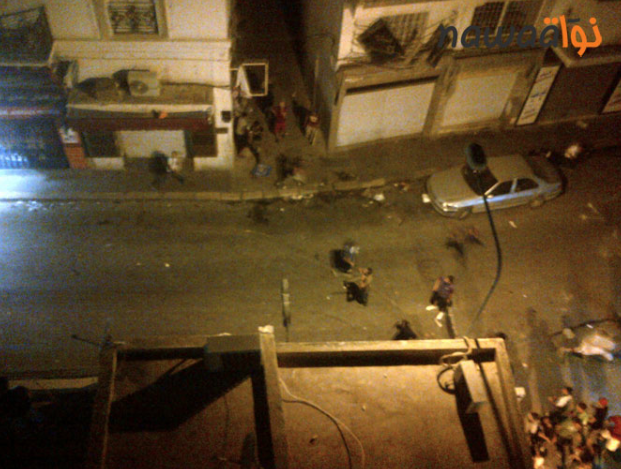
[Individuals attacked demonstrators present in front of Tunisian General Labor Union (UGTT) headquarter by throwing stones.]
10:45pm – UGTT headquarters – Tunis: Demonstrators are leaving the Tunisian General Labor Union (UGTT) headquarters towards the Constituent Assembly.
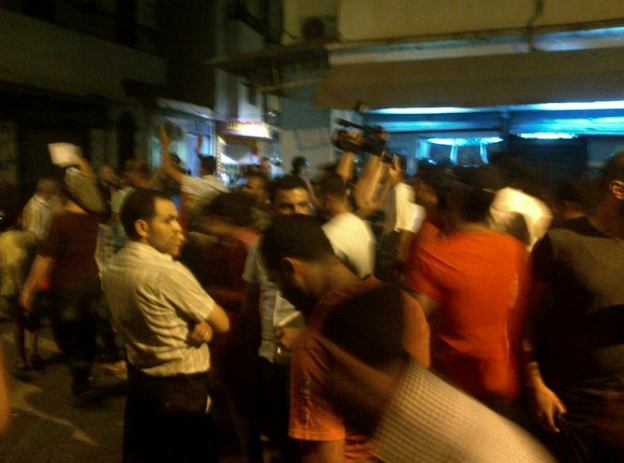
[10:45pm – UGTT Labor Union HQ – Tunis: Demonstrators leave the Tunisian General Labor Union headquarters towards the Constituent Assembly.]
10:30pm – UGTT Labor Union headquarters – Tunis: Gathering in front of Tunisian General Labor Union (UGTT) headquarters.
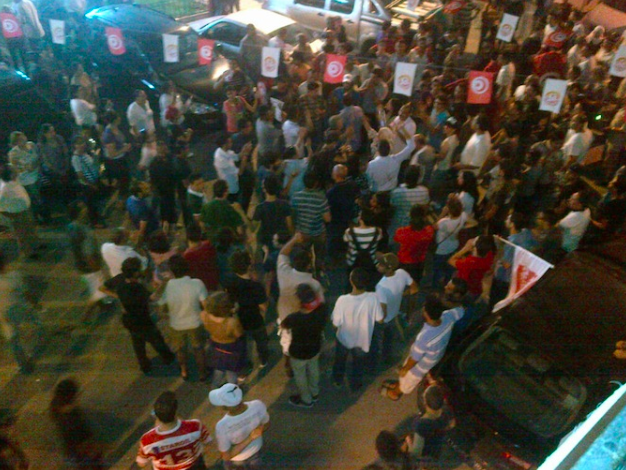
[10:30pm – UGTT Labor Union headquarters – Tunis : Gathering in front of Tunisian General Labor Union (UGTT) headquarters.]
10:21pm – Bardo -Tunis – Constituent Assembly: Police strengthened its ranks in front of the Constituent Assembly. Normal situation around the buildings.
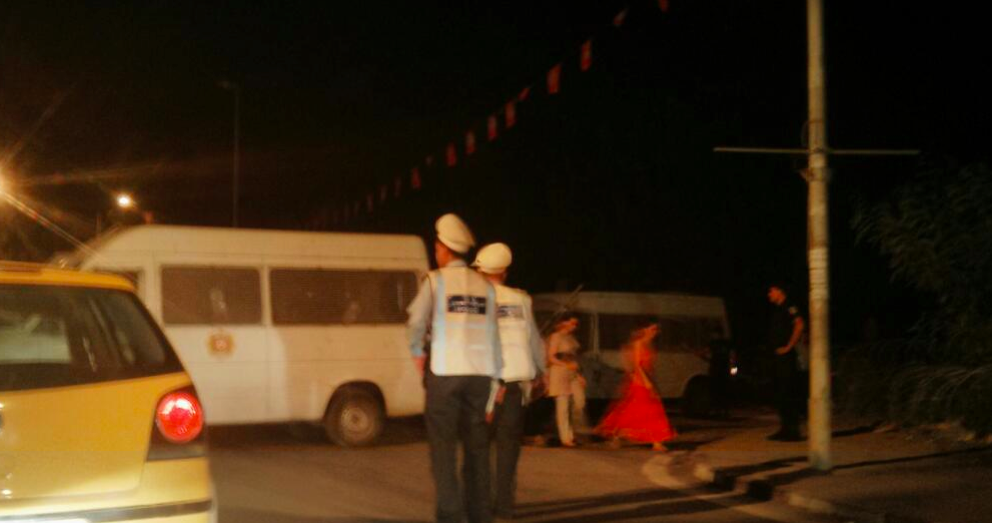
[Police strengthened its ranks in front of the Constituent Assembly. Normal situation around the buildings.]
10:14pm – Habib Bourguiba avenue – Tunis: Excessive and disproportionate use of tear-gas against protestors and others in Bourguiba Ave and adjacent streets.
9:36pm – Habib Bourguiba avenue: Police firing teargas on demonstrators in Bourguiba Avenue spreading panic amongst crowd.
9:30pm – Tunisair Press Release: The airline says it suspend all its flights tomorrow, 26 July. “Following the advice of a general strike in Tunisia: Tunisair Tunisair Express inform their guests that all scheduled flights to and from Tunisia in the day of 26 July are canceled.”
9:05pm – Mohamed V avenue: Access to Habib Bourguiba avenue has been blocked from Mohamed V avenue.
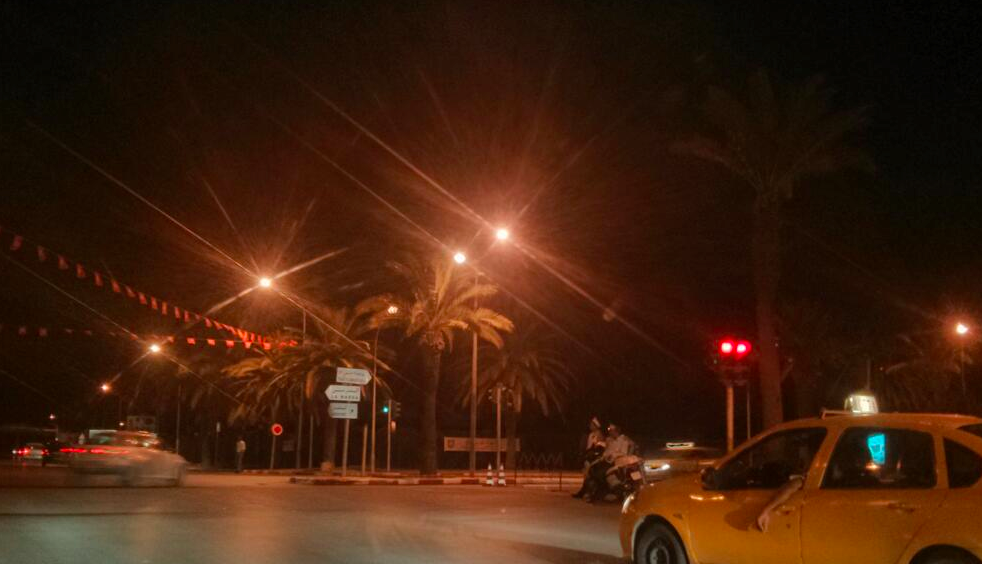
[Image of access to Habib Bourguiba avenue blocked from Mohammed V avenue.]
8:57pm – Tunis: Youth activists of the Popular Front has called for an open sit-in in front of the Constituent Assembly starting at 9pm tonight.
6:55pm – Habib Bourguiba avenue: Most of the protestors already left the street to break their fast.
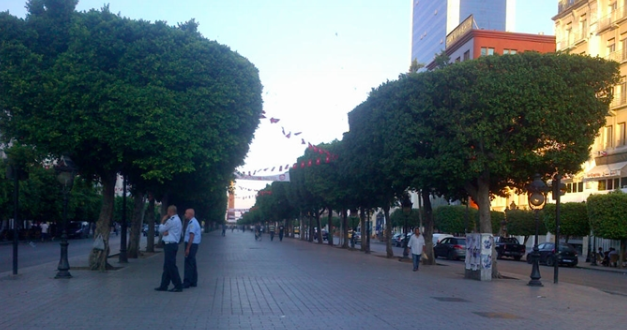
[Image of an empty Habib Bourguiba avenue when protesters broke their fast. Image by Perrine Massy/www.nawaat.org]
6pm – Sfax: The collective of political parties and NGOs has met in the Watad headquarters to call for :
- All citizens for civil disobedience,
- The members of the national assembly to resign,
- The dissolution of the national assembly and all instances derived from it (the gouvernement and the presidency),
- The formation of a national salute and unity government,
- The dissolution of all religious-based political parties for their involvement in the assassinations and the dissolution of all militias and violent groups (LPR…),
- The security and military institutions to stay politically neutral,
- All citizens of Sfax to join an open Sit in to be held in front of the City Hall.
5:25pm – Ariana: Police est intervened to separate two guys fighting in front of the ambulance. Police took profit from the situation to force the ambulance to “Route X,” heading it to Charles Nicolle hospital.
5:15pm – Ariana: The procession is heading to the entry of Ariana, blocked by the police to avoid it getting the Bourguiba avenue.
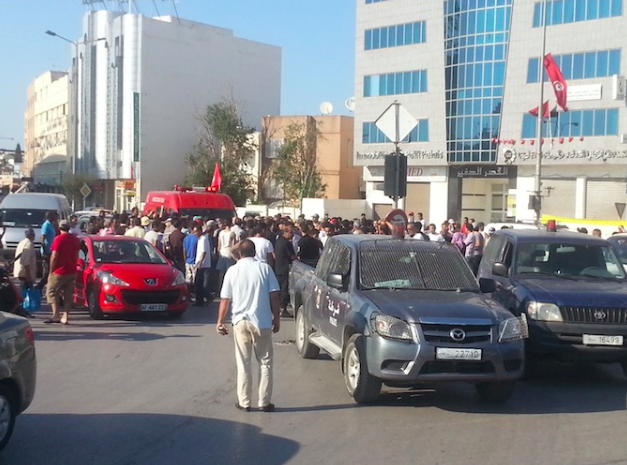
[Image by Lilia Blaise/Nawaat.]
4:50pm – Ariana: The body is escorted to el Ghazella.
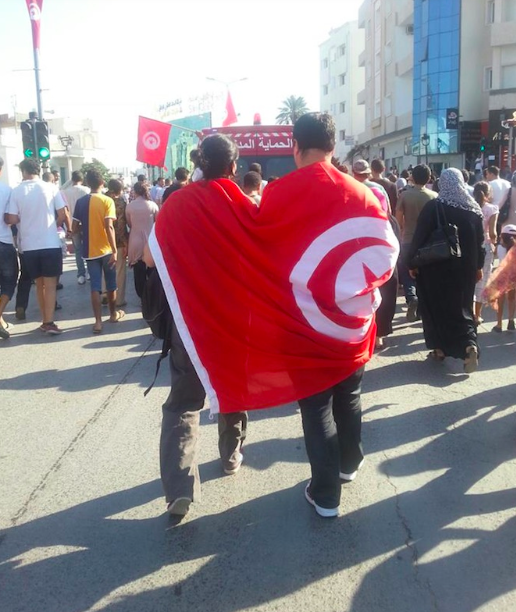
[Image by Lilia Blaise.]
4:15pm – Front Populaire headquarters: Publishing of a press release. During the conference Hamma Hammami, the spokesman of the party called to :
- Civil disobedience,
- The fall of the government,
- The dissolution of the national assembly,
- The creation of a national salute and union movement,
- General strike during the funerals day (26 July).
4:10pm – “Mahmoud Matri” Hospital: Body of Mohamed Brahmi
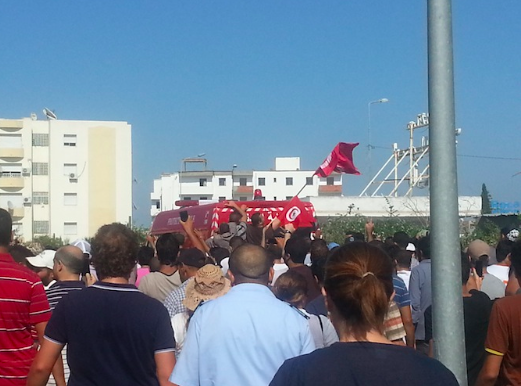
[Hôpital Mahmoud Matri. Image by Lilia Blaise/Nawaat.]
4pm – Habib Bourguiba avenue: Between one thousand and fifteen hundred people in front of the Interior Ministry headquarters.
4pm – Sidi Bouzid: City Hall headquarters is on fire.
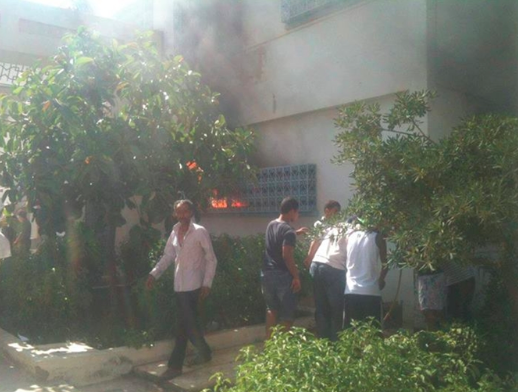
[Image of the Sidi Bouzid governor`s office on fire. Image by SBZone/Nawaat.]
3:50pm – Habib Bourguiba avenue: Protesters surround and push over a police vehicle.
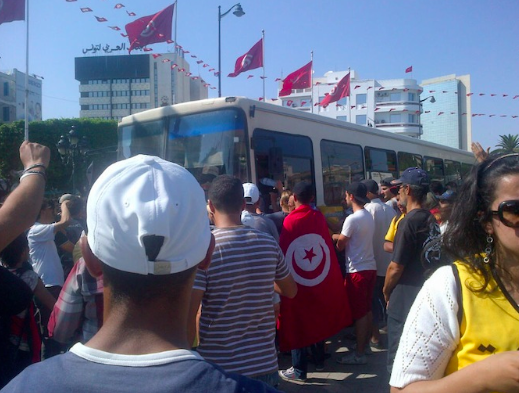
[Image of Habib Bourguib avenue. Perrine Massy/www.nawaat.org.]
3:40pm – “Mahmoud Matri” Hospital: Nourreddine Hached, son of Farhat Hached arrives to the hospital.
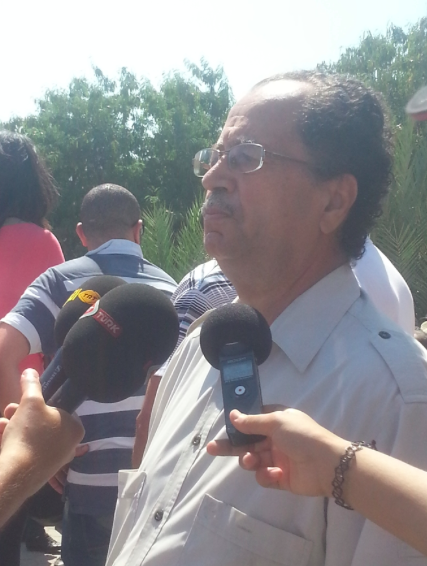
3:25pm – Mosaïque FM: Ahmed Nejib Chebbi, from Al Joumhouri, requests the creation of a National Unity government.
3:20pm – L’UGTT (Tunisian General Labor Union): Call for a general national strike for 26 July.
3:10pm – Sidi Bouzid, Mohamed Bouazizi avenue: A gathering in front of the city hall. Few clashes between security forces and protestors. Most of the protestors are from Al Jabha and Attayar Achaabi.
3:10pm Front Populaire headquarters: Meeting starts with many representatives of the Front Populaire, Nidaa Tounes and Dousstourna.
2:45pm – Habib Bourguiba avenue: A march started in Place Med Ali (headquarters of the Labor Union) gets to the main Tunis avenue. Few hundreds are protesting and the march is getting larger.
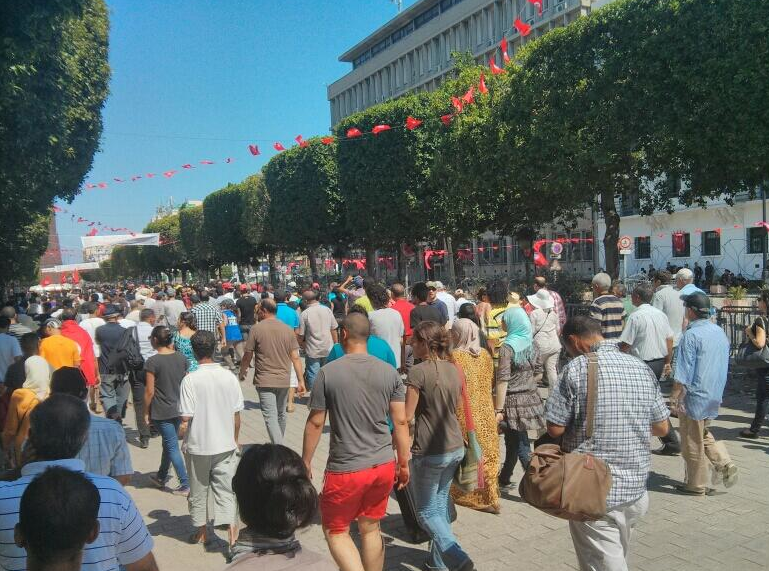
2:45pm : Mosaïque FM: Rachid Ghannouchi, leader of Ennahda :
It’s a murder against the Tunisian state and the democracy. They seek to push Tunisians to exchange accusations. (…) Those who committed this murder are enemies of democracy. The Tunisian revolution was peaceful, they want to turn it bloody while the national assembly is almost done with the writing of constitution and the setup of the institutions that will lead the country to the next free elections (…) We request a national anti-violence coalition.
2:40pm : Home of Mohamed Brahmi: neighbors are claiming they heard five gunshots and not eleven, around 12:10. One of the daughters of Mohamed Brahmi declares to radio Kalima seeing the two aggressors on a motorcycle.
2:15pm: Communique of the spokesman of the Presidency of the republic: We condemn the assassination of deputy Mohamed Brahmi, ”a crime committed on the anniversary of the Republic Day” while the national assembly is working on the finishing of the transitional phase, explains the communique.
The communique calls on the Tunisians not to fall into the trap of violence.
2:pm – “Mahmoud Matri” Hospital :
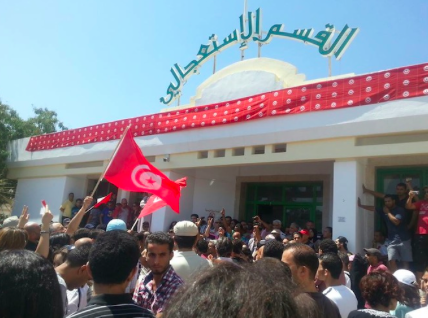
[Hôpital Mahmoud Matri. Image Lilia Blaise/Nawaat.]
2pm – “Mahmoud Matri” Hospital: Many spontaneous calls to a gathering in front of the national assembly. A meeting of the “Democratic coalition” is planned to be held at 3pm at the “Front Populaire” headquarters.
1:58pm – 2pm – “Mahmoud Matri” Hospital: Around three hundred people are gathering within whom many political figures: Mohamed Jmour, from the Watad parti, Mehdi Ben Gharbia, of the democratical coalition, deputy Brahim Kassas, lawyer Leila Ben Debba, lawyer Saida Garrach, syndicalist Thouraya Krichen. Hamma Hammami was also present, he stayed less than one hour and was under heavy security escort.
1:35pm – Habib Bourguiba avenue: Police blocks entries to the interior ministry headquarters. Around five hundred protesters starting the march.
1pm – Today: Mohamed Brahmi deputy from Echaab (quited since July) and founder of Parti Courant Populaire (Attayar Achaabi) assassinated this morning when leaving his home in the Al Ghazela area of Ariana (near Tunis).
[This report was originally published on Nawaat.]